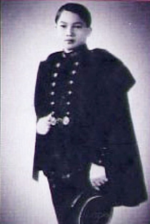Nguyen Ngoc Bich: Difference between revisions
Loc Vu-Quoc (talk | contribs) No edit summary |
Loc Vu-Quoc (talk | contribs) No edit summary |
||
| Line 45: | Line 45: | ||
* Vu Quoc Loc (2023a)<ref name=VQL.2023a /> | * Vu Quoc Loc (2023a)<ref name=VQL.2023a /> | ||
* Vu Quoc Loc (2023b)<ref name=VQL.2023b /> | * Vu Quoc Loc (2023b)<ref name=VQL.2023b /> | ||
* Nguyen Ngoc Chau, Vu Quoc Loc (2023)<ref name=NNC.VQL.2023> | * Nguyen Ngoc Chau, Vu Quoc Loc (2023)<ref name=NNC.VQL.2023 /> | ||
== References == | == References == | ||
Revision as of 09:32, 6 April 2024
| Nguyễn Ngọc Bích | |
|---|---|
| Born | 18 May 1911 Ben Tre, Vietnam |
| Died | 4 Dec 1966 Thu Duc, Vietnam |
| Occupation | *Engineer
|
| Title | Doctor (medical) |
| Known for | Resistance war, politics |
Nguyễn Ngọc Bích (1911–1966) was a French-educated engineer, a hero in the Vietnamese resistance against the French colonists,[1]: 850. [2] a French-educated medical doctor, an intellectual and politician, who proposed an alternative viewpoint to avoid the high-casualty, high-cost war between North Vietnam and South Vietnam.[3]
The Nguyen-Ngoc-Bich street in the city of Cần Thơ, Vietnam, was named after him to honor and commemorate his feats (of sabotaging bridges to slow down the colonial French-army advances) and heroism (being on the French most-wanted list,[4] imprisoned, subjected to an "intensive and unpleasant interrogation"[4] that left a mark on his forehead,[lower-alpha 1] and exiled) during the First Indochina War.

Upon graduating from the École polytechnique (engineering military school under the French Ministry of Armed Forces) and then from the École nationale des ponts et chaussées (civil engineering) in France in 1935,Template:Sfn Dr. Bich returned to Vietnam to work for the French colonial government. After World War II, in 1945, he joined the Viet-Minh, and became a senior commander in the Vietnamese resistance movement, and insisted on fighting for Vietnam's independence, not for communism.
Suspecting[lower-alpha 2] of being betrayed by the Communist faction[lower-alpha 2] of the Viet-Minh and apprehended by the French forces, he was saved from execution by a campaign for amnesty by his École polytechnique classmates based in Vietnam, mostly high-level officers of the French army,Template:Sfn and was subsequently exiled to France, where he founded with friends and managed the Vietnamese publishing house Minh Tan (in Paris), which published many important works for the Vietnamese literature.[lower-alpha 3] In parallel, he studied medicine and became a medical doctor. He was highly regarded in Vietnamese politics, and was suggested by the French in 1954 as an alternative to Ngo Dinh Diem as the sixth prime minister of the State of Vietnam under the former Emperor Bao Dai as Head of State,[lower-alpha 4] who selected Ngo Dinh Diem as prime minister. While Bich's candidature for the 1961 presidential election in opposition to Diem was, however, declared invalid by the Saigon authorities at the last moment for "technical reasons",Template:SfnTemplate:Sfn, he was "regarded by many as a possible successor to President Ngo Dinh Diem".Template:Sfn[lower-alpha 5][lower-alpha 6]
A large majority of the information in this article came from the master document Nguyen Ngoc Bich (1911–1966): A Biography,Template:Sfn which contains even more information, including primary-source evidence and photos, than presented here.
Notes
To cite in text:
- Buttinger (1967a)[5]
- Napalm.[6]: 10
- Vu Quoc Loc (2023a)[7]
- Vu Quoc Loc (2023b)[8]
- Nguyen Ngoc Chau, Vu Quoc Loc (2023)[9]
References
- ↑ Buttinger, Joseph (1967b), Vietnam: A Dragon Embattled, Vol.2, Frederik A. Praegers, New York. Retrieved on 25 Feb 2023
- ↑ See notes and quotations in Vu Quoc Loc (2023a), Notes on Vietnam History, Internet Archive, retrieved 27 Jun 2023, CC BY-SA 4.0.
- ↑ Nguyen-Ngoc-Bich (March 1962), "Vietnam—An Independent Viewpoint", The China Quarterly 9. Retrieved on 18 Feb 2023, pp. 105–111. See also the contents of Volume 9, which included the articles of many well-known experts on Vietnam history and politics such as Bernard B. Fall, Hoang Van Chi, Phillipe Devillers (see, e.g., his classic 1952 book Histoire du Viet-Nam in Section References and French French Cochinchina, Ref. 40), P. J. Honey, Gerard Tongas (see, e.g, J'ai vécu dans l'Enfer Communiste au Nord Viet-Nam, Debresse, Paris, 1961, reviewed] by P. J. Honey), among others.
- ↑ 4.0 4.1 Cooper, 1970, p=122.
- ↑ Buttinger, Joseph (1967a), Vietnam: A Dragon Embattled, Vol.1, Frederik A. Praegers, New York. Retrieved on 25 Feb 2023
- ↑ Napalm
- ↑ Vu Quoc Loc (2023a), Notes on Vietnam History, Internet Archive. Retrieved on 27 Jun 2023, CC BY-SA 4.0.
- ↑ Vu-Quoc-Loc (2023b), Marco Polo's Caugigu - Phạm Ngũ Lão's Đại Việt - 1285, Internet Archive. Retrieved on 23 Apr 2023, CC BY-SA 4.0.
- ↑ Nguyen-Ngoc-Chau & Vu-Quoc-Loc (2023), Nguyen Ngoc Bich (1911–1966): A Biography, Internet Archive. Retrieved on 21 Mar 2023, CC-BY-SA 4.0. (Backup copy.) Much of the information in the present article came from this biography, which also contains many relevant and informative photos not displayed here.
Cite error: <ref> tags exist for a group named "lower-alpha", but no corresponding <references group="lower-alpha"/> tag was found